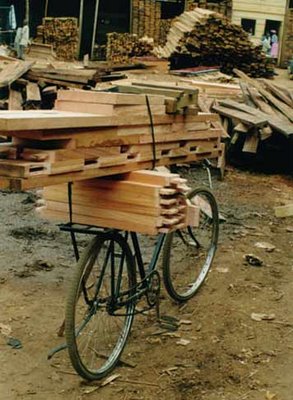 I came across this picture this morning, as I browsed the design blogs...I felt compelled to post it. It was taken by David Stairs, who was in Uganda with Designers Without Borders. The picture is from a short article on furniture makers/designers in Uganda published on the Design Observer- an interesting read.
I came across this picture this morning, as I browsed the design blogs...I felt compelled to post it. It was taken by David Stairs, who was in Uganda with Designers Without Borders. The picture is from a short article on furniture makers/designers in Uganda published on the Design Observer- an interesting read.For me, the nagging subtext of 'design' as it now known in our country, often speaks less to the accessibility of things thoughtfully created, and more to things opulently created. Like everyone else (or nearly everyone else) I appreciate nice things. Indeed, one of the reasons I began designing was that I felt that I had a talent, or ability to create nice things. But I often struggle with what we do as designers. If one stops and puts the frenzied rush to create, and recreate things to be manufactured and sold in a global context- an environmental and social context- would we like the answers? Is the return for the work equal or greater than the costs? Do we do more damage in creating things than improving? And what of the granite countertops, the stainless steel skins on our refrigerators, ovens, dishwashers, and coffee makers, our SUV's for carrying babies and strollers (....I could go on)?
What is really at issue for me is that the other reason I went into design was to create a better, more livable world through design....and that doesn't mean more high priced stuff...it is about creating a world of goods and environments that is affordable to more than just the wealthiest of our society. To work exclusively for that end is an activity equal to the crimes of those who mass the wealth at the cost of the rest of us. While as designers we absolve ourselves of being party to this over consumption by believing that we are only providing the service that is being asked for- we are often passive in our roles as visionaries for something better. Truly, we are not the problem, the problem is far greater than just one group or segment, the problem seems to be our business model. So how do we change? Better yet, how do we change the conversation? Because that's really the problem, right? -That we are involved in a conversation that will not end with a resolution. Instead of asking what 'thing' can I produce that is better, we should be asking what kind of world do we want? But then that might require a consensus.
No comments:
Post a Comment